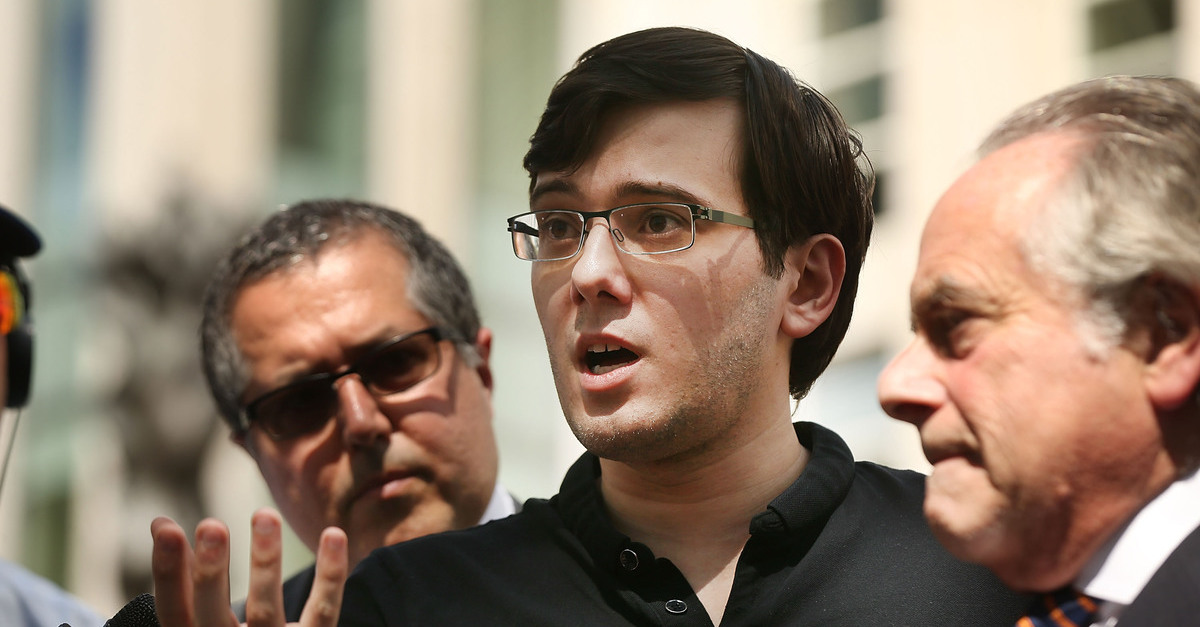
Ex-pharmaceutical executive Martin Shkreli speaks to the press in front of U.S. District Court for the Eastern District of New York with members of his legal team after the jury issued a verdict on Aug. 4, 2017.
Disgraced pharmaceutical executive Martin Shkreli told a judge that he will not testify at or attend a civil trial that could lead to his lifetime ban from the industry because he is still in prison, and he has been denied remote access to the courtroom.
“Mr. Shkreli respectfully informs the Court that for the reasons set forth in his motion, he does not intend to personally attend and testify at trial,” Shkreli’s lawyer Christopher H. Casey wrote in a letter on Wednesday. “As such, we will not be presenting the Court with a writ of habeas corpus on his behalf.”
Shkreli is facing a bench trial on Dec. 14 this year, where U.S. District Judge Denise Cote will determine without a jury whether he engaged in anticompetitive conduct by jacking up the price of the live-saving drug Daraprim 40-fold. When he first raised the price that high, Shkreli led a company known as Turing Pharmaceuticals, and the act that earned him national scorn and the moniker “Pharma Bro.”
He is currently serving a seven-year sentence for different conduct, described by federal prosecutors as a “Pyramid-like scheme” defrauding investors of a separate company. His release date from a low-security prison in Allenwood, Pa. is scheduled for Oct. 22, 2022, federal records show.
While Shkreli’s was still behind bars, New York State Attorney General Letitia James (D) filed a lawsuit against Turing’s rebranded successor Vyera Pharmaceuticals, LLC and two of its former CEOs: Shkreli and Kevin Mulleady, alleging that anticompetitive conduct over Daraprim never ended. The Federal Trade Commission (FTC) and attorneys general of California, Illinois, North Carolina, Ohio, Pennsylvania, and Virginia later joined the case, which could lead to his permanent ban from the industry.
On Nov. 1, federal regulators offered Shkreli’s defense attorneys an alternative to live trial testimony, saying “we will accept Shkreli’s direct testimony in his affidavit and will ‘cross -examine’ him by designating portions of his earlier deposition testimony.” Regulators also requested a “short” deposition of Mr. Shkreli to “lay the foundation for the admissibility of certain documents if we are unable to resolve such issues pretrial.”
Shkreli’s defense team said they oppose that option, calling the request “vague.”
“Plaintiffs do not even identify the documents purportedly at issue, i.e., whether they are referring to the documents introduced at Mr. Shkreli’s deposition or other documents,” the letter states. “Nor do plaintiffs explain what they mean by a ‘short’ deposition, or the scope of such a deposition. For example, plaintiffs do not explain how they intend to lay the foundation for the admissibility of a document without getting into questions regarding the substance of the document – in other words, without conducting a second substantive deposition of Mr. Shkreli. This would effectively allow plaintiffs to choose two of the Court’s options rather than one.”
Judge Cote has set a hearing on Thursday afternoon at 4 p.m. to discuss Shkreli’s letter.
Read the letter, below:
(Photo by Spencer Platt/Getty Images)